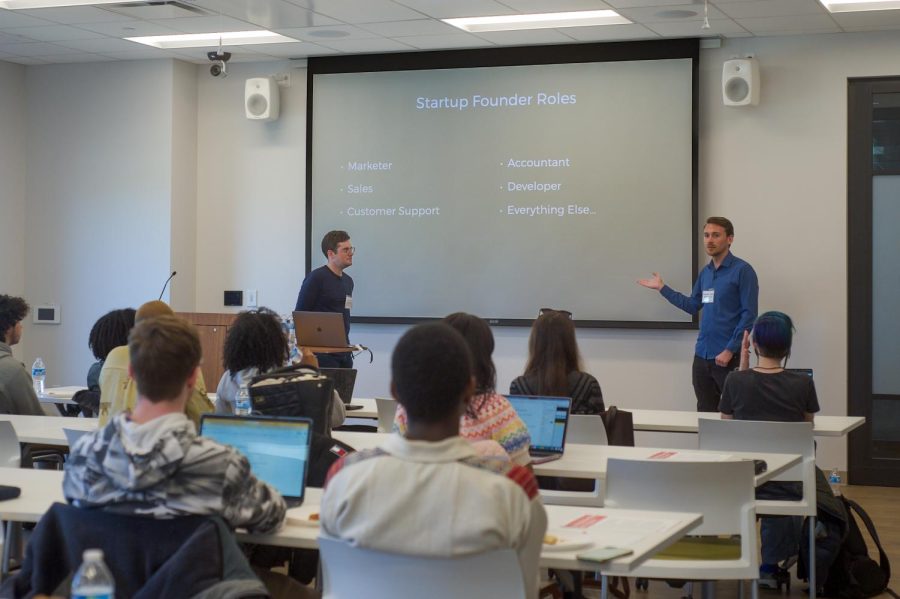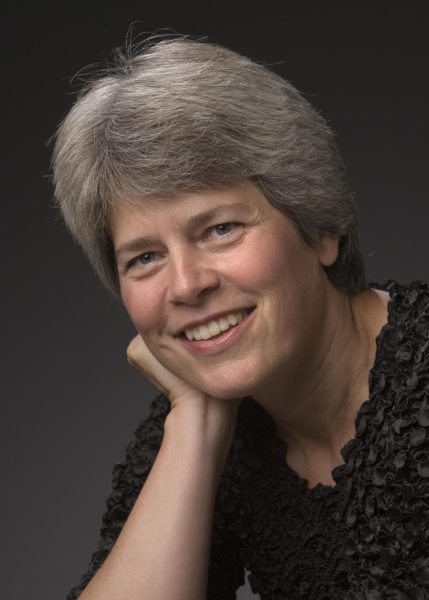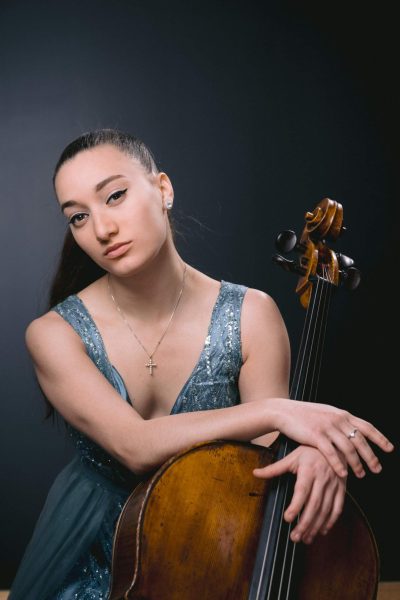Bryan Rubin and Ben Steger: Entrepreneurs, Co-Founders of Virtu.Academy
Bryan Rubin and Ben Steger presented a talk Thursday in StudiOC.
Oberlin alumni Bryan Rubin and Ben Steger, OC ’18, co-founded Virtu.Academy, a virtual space that connects music teachers with students, in 2018. This business was boosted by Oberlin’s LaunchU competition for entrepreneurs, which is starting up again this year. Rubin and Steger returned to Oberlin Thursday to share their story and give advice to other budding entrepreneurs.
This interview has been edited for length and clarity.
Where did the idea for Virtu.Academy come from, and how did it come to fruition?
Ben Steger: Originally, I was thinking that we have so many really talented musicians here, and for people who want to teach a little bit more and gain that experience, there’s not a ton of opportunities to teach around Oberlin. At the same time, through LaunchU, we were talking to schools in rural communities around Ohio where the nearest music teacher for any instrument was two hours away.
We thought, well, we have all this talent at Oberlin and all of these students who don’t have access to music lessons. Originally we called it ObieTeach, and it was just going to be some students at Oberlin who would teach. Once people graduated, it spread around different conservatories, and we now have people all over the world teaching.
Does Virtu.Academy offer any other resources besides private lessons?
BS: Yeah, something newer we’ve been experimenting with lately is virtual classes. All of our teachers have different passions and things that they’re super excited about, so it’s an opportunity for them to just come up with an idea for a class. There’s been classes around marketing — the business side of music — as well as jazz history and all sorts of subjects. We also have a blog section, which is still in progress. Hopefully we’ll have some more interviews with well-known musicians and some of our own teachers.
How did Oberlin prepare you to be business owners?
Bryan Rubin: We wouldn’t be here without Oberlin. Especially with the LaunchU program, which is one of the reasons we’re coming back to talk — because they’re rebooting it. I think Oberlin really helps because you get this liberal arts education, so you’re not focused on just one thing. When we started the business, I came from more of the arts side of things, and Ben had a finance and mathematics background, so we really worked well together. I was able to use things that I did from my photo and video classes at Oberlin and translate that into marketing in creative ways that I thought I would never really be able to do.
BS: Another aspect of it is when you’re running a business and it’s just two people, you have to be the marketing person and the developer and the finance person. You have all of these different roles that you have to play before you can afford to actually hire people. I think the liberal arts experience at Oberlin helps prepare you for all the crazy stuff you have to learn really quickly, versus if you went to a business school and only knew the finance side of it.
BR: This is something we’ll touch on in the talk we’re giving, but when we won the grant from LaunchU, we didn’t give up everything and go full-time with Virtu.Academy. We went down our paths that we were going down at Oberlin already. I worked for the U.S. Environmental Protection Agency, doing photo and video work with the Environmental Studies degree that I had. I think there’s a misconception that you have to drop everything if you have a business idea and go all in, whereas we slowly worked on it over the weekends and nights after our actual jobs that provided our income. That allowed us to continue to work on it without having to stress out about getting funding.
Do you think that entrepreneurship is important for Conservatory students in particular?
BS: Well, there’s just a lot of different career paths that I think people don’t know about. You could graduate with a music degree and want to do some performing, but then you have some ideas for something like an arts nonprofit, or maybe you want to work with another company. Having a more entrepreneurial mindset where you’re willing to start things and run with it gives you a lot more options as a professional artist.
Is there anything you wish Oberlin had better prepared you for?
BS: I definitely think there should be more focus on the music business side of things. We only really got that side of it from the LaunchU program, so I’m really glad to hear that they’re starting to launch more entrepreneurship stuff, because that’s essential. Unless you graduate and get, say, an orchestra job right away, you probably need some networking skills.
What advice do you have for starting a business with a music degree?
BS: As Bryan said before, if you have an idea, grow it out organically. Now, there are so many resources out there for starting a business without spending a ton of money. You can build a website and register a company for under $100. Also, being resourceful and willing to figure out some other ways to start up, rather than taking the traditional entrepreneurship route, is helpful.
BR: This allows you to take more risks with it, too. Because again, it’s not your life yet. If something doesn’t work, oh well, try again. That’s what it was like in the beginning for us. We would spend late nights trying these different ads or different weird ideas, and it didn’t work. That was fine because we still had our jobs. Once we kind of got into a groove with trial and error, we knew what to expect if we could just jump off a ledge. But it’s no longer a ledge, you know, it’s just a little hill.
Any goals for the future of Virtu.Academy?
BS: We just want to keep growing it as much as we can. We’re now starting to work with school districts and big tutoring organizations. That’s definitely one of the big focuses now — expanding from just selling lessons to individual families to working with school districts and larger strategic partnerships like that.






